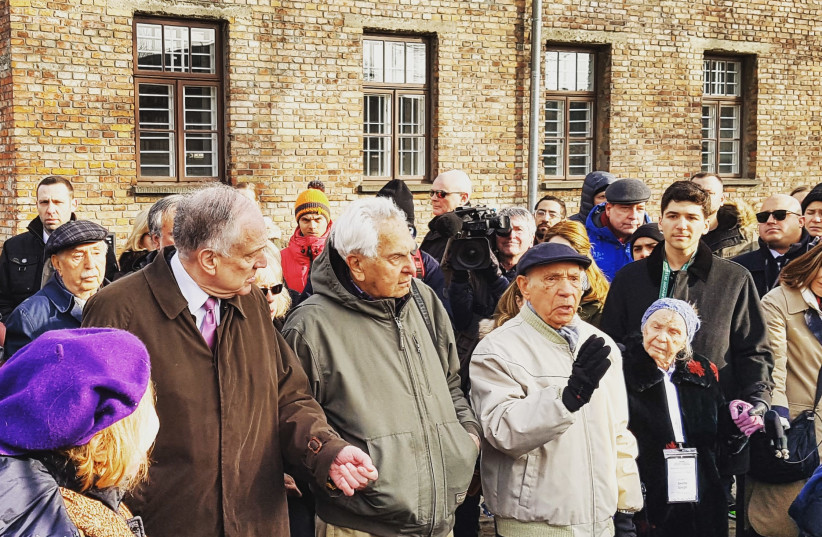About 165,000 Holocaust survivors now live in Israel, their average age is 85, 25% of them live below the poverty line, a third live alone and about 15,000 die every year. Holocaust survivors have various rights that are determined according to their story of personal persecution and their health situation, granted by various bodies in Israel and abroad.
The Aviv (Spring) for Holocaust Survivors nonprofit association has been working for over 15 years to help Holocaust survivors in Israel maximize their rights, and assists them in exercising their rights from all bodies in Israel and abroad, without any payment on their part.
In the past year, the organization has helped 9,310 Holocaust survivors realize rights with benefits worth NIS 77 million. These benefits give Holocaust survivors financial security in advanced age and enable them to grow old with dignity and welfare.
The organization’s data indicates that about 50% of Holocaust survivors who contacted the organization did not exhaust the totality of their rights before contacting us and we helped them to exercise additional rights. How is it possible that 77 years after the end of the war, so many Holocaust survivors are finding it difficult to exercise the rights they are entitled to by law?
There are two reasons for this. The first is actually due to a positive process – in recent years new updates and amendments have been made in Israel and abroad, ghettos that were not previously recognized have been recognized, new programs and grants have been opened, and thousands of additional Holocaust survivors entered the eligibility scope for monthly allowances. But, many are unaware of the new changes and updates.

Even those who are exposed to information do not know what the responsible body is in many cases. An internal survey conducted by the association recently found that 61% of respondents contacted the association because they did not know which body to turn to in order to exercise their rights.
The second reason is the bureaucracy required in the process of exercising these rights. The amount of monthly allowances for Holocaust survivors is determined according to the recipient’s story of personal persecution, health situation and percentage of disability from diseases recognized as a result of Nazi persecution, as well as their economic situation (income can be supplemented according to health status and economic situation).
In the case of deteriorating health, it is possible to increase the percentage of disability – but medical approvals must be produced from specialist doctors and applications must be submitted to the body that pays. Although in recent years Holocaust survivors have not been required to physically appear before medical committees and requests can be discussed without the applicant present, for Holocaust survivors, most of whom are 80 or older, this is still a complex bureaucratic process that requires the help and intervention of family members.
And what about those who have no one to help them? The survey indicates that 30% of applicants to the organization did so due to worsening medical conditions, 30% needed help in filling out forms and 20% needed help because they were housebound or due to language difficulties. I believe that leniency should be granted to Holocaust survivors, and high and uniform disability rates determined for them from the age of 80, instead of harassing Holocaust survivors by having them send disability requests and filling out forms.
The most significant figure in the survey indicated the extent to which professional assistance in exercising life-changing rights is – 62% of respondents noted that the organization’s assistance ended on receiving new financial rights that they had not previously received and another 17% said that the process in their case has not yet ended.
In about a decade, only about 30,000 Holocaust survivors will live among us. We will not have another opportunity to help the generation of Holocaust heroes. It is our duty to ensure that Holocaust survivors receive the rights they deserve by right, not out of charity, so that they age with dignity and welfare. Since its founding, the Aviv for Holocaust Survivors nonprofit association has fulfilled its vision – “that every Holocaust survivor lives with dignity and welfare.”
But, we’re in a race against time. Now, the lawmaker must pick up the gauntlet. I call on the Holocaust Survivors’ Rights Authority and the Ministry for Social Equality to rethink the removal of bureaucratic barriers for Holocaust survivors. These facilitations will enable more Holocaust survivors to fully exercise their rights, and give them peace of mind and economic security in their final years.
The writer is the CEO of Aviv (Spring) for Holocaust Survivors, a nonprofit association that assists Holocaust survivors in exercising their rights, free of charge.
